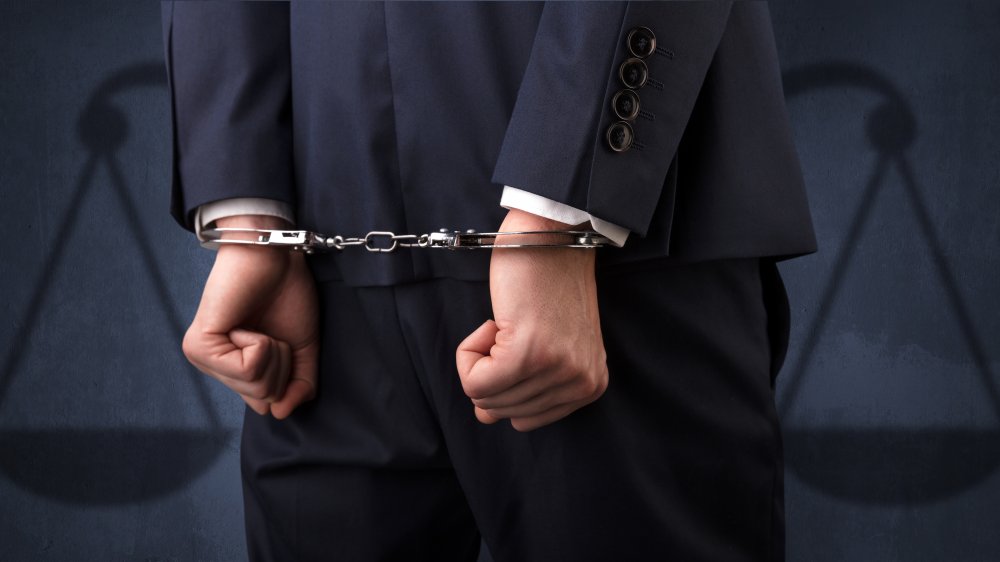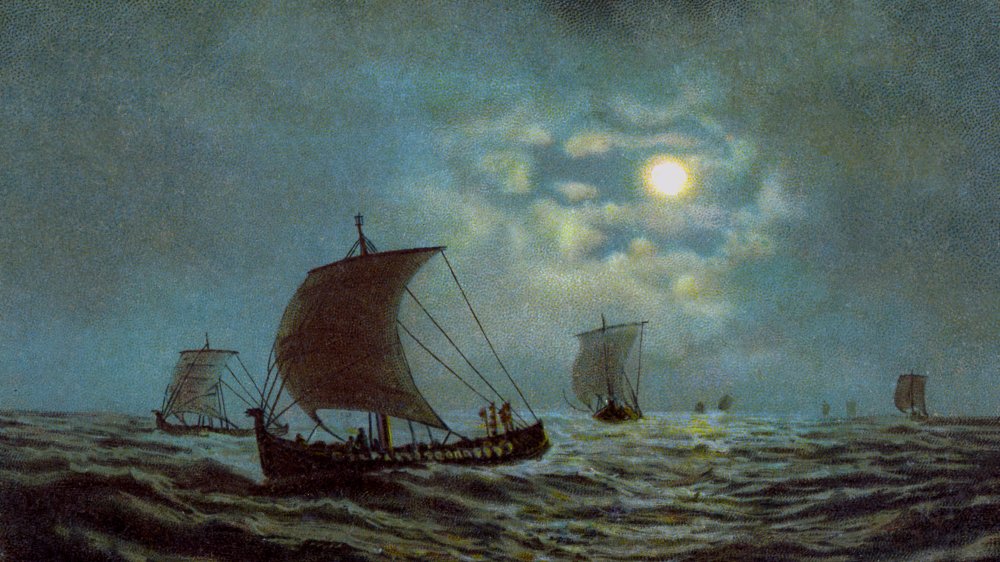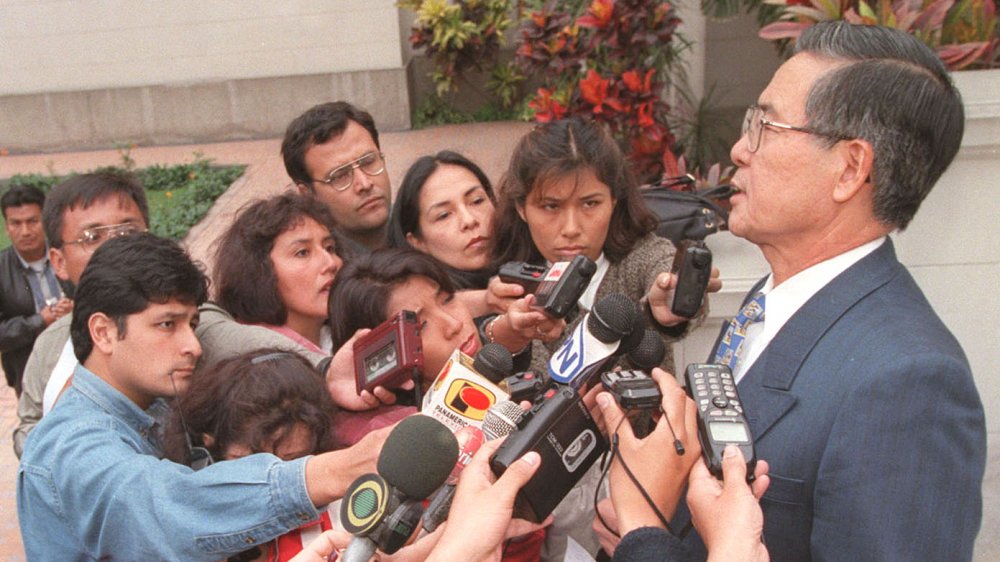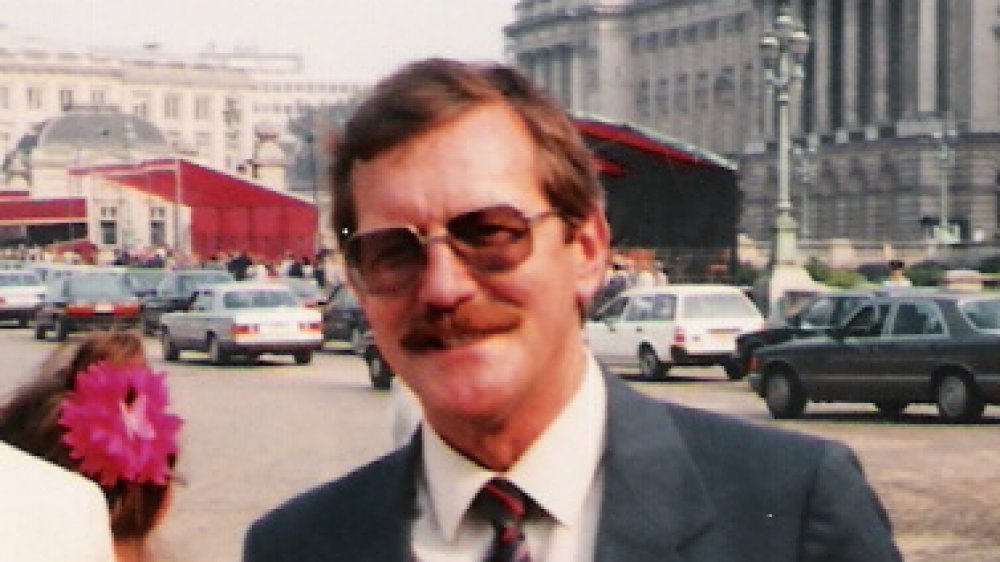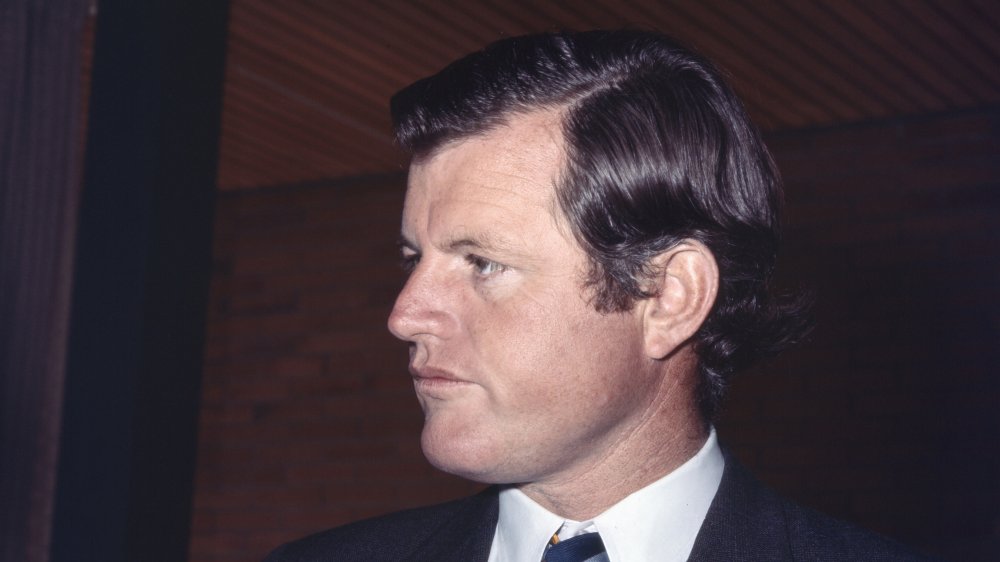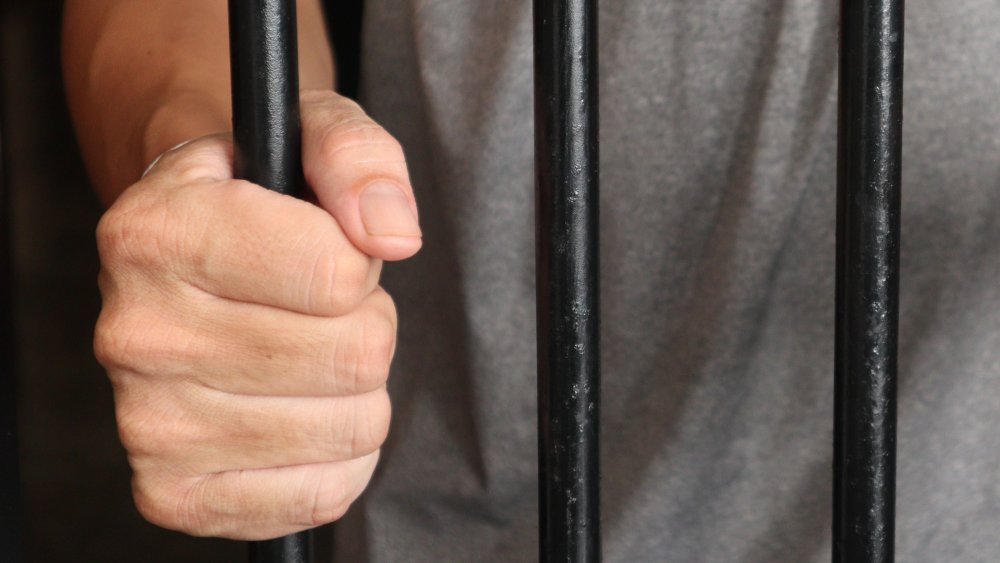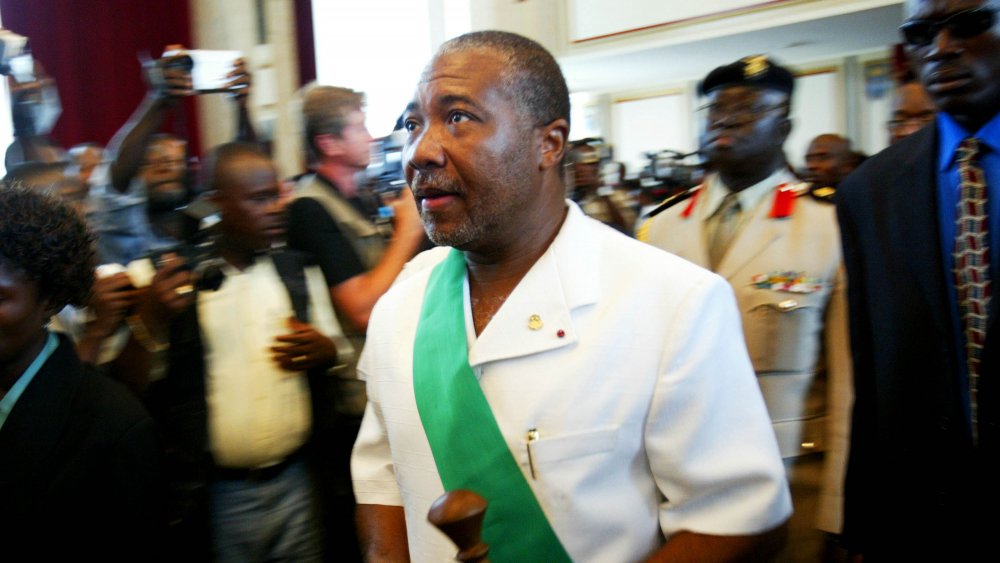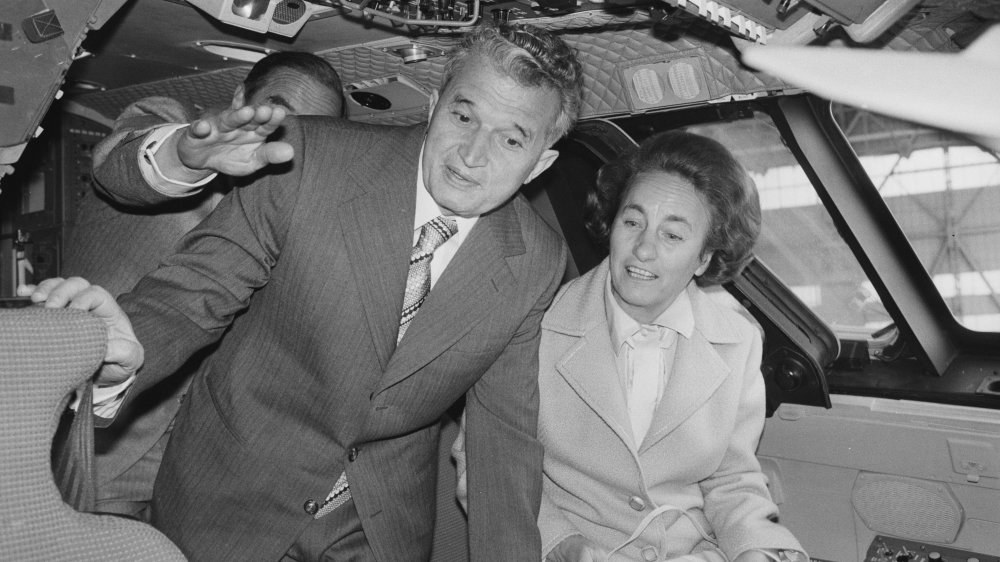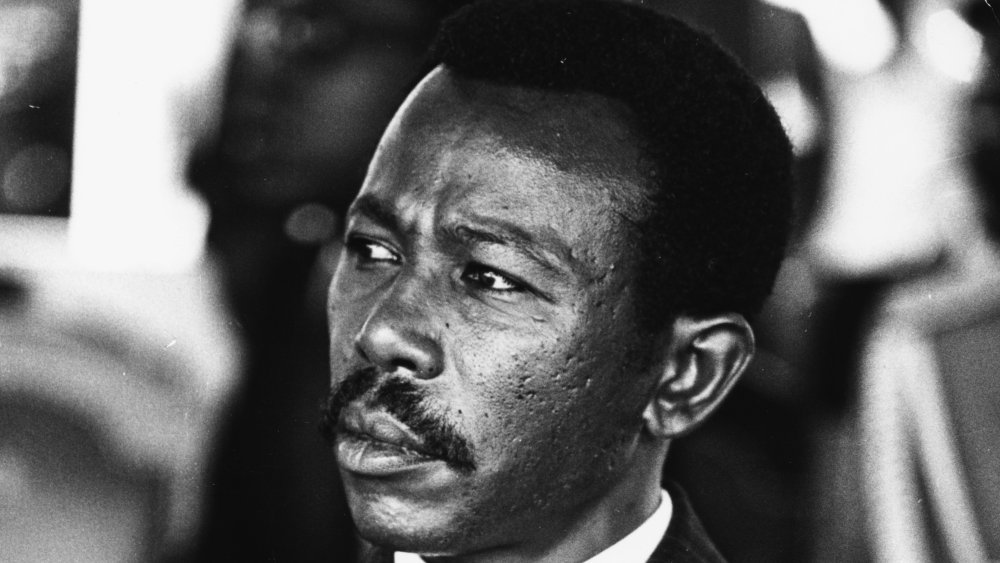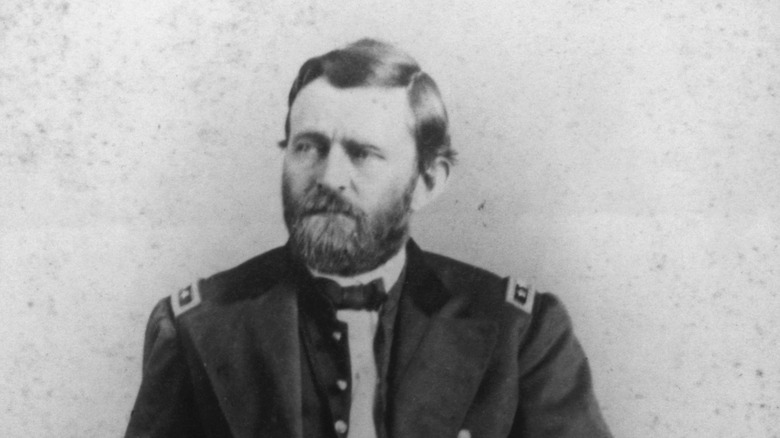Crazy True Stories Of Politicians Convicted Of Crimes
While one might expect politicians to be held to higher standards than the average citizen, they often end up with comparatively reduced sentences for their transgressions. While politicians are more often than not convicted on charges of corruption, there have been several occasions where they've been convicted for more murderous schemes. Whether it's for genocidal war crimes or simply getting rid of someone who is a political opponent, politicians have resorted to murder on multiple occasions.
Some politicians who are charged and convicted end up serving a prison sentence. Others may go through a trial but avoid prison, while still others may be tried in absentia and are able to avoid the whole trial and prison process altogether. But at the end of the day, some politicians are able to continue serving while awaiting trial, or even after being sentenced to death. These are the crazy true stories of politicians convicted of crimes.
One murder only scratches the surface
Thomas John Ley, born on October 28, 1880, immigrated to Australia from England and always had bold political aspirations. Initially elected to the local council of Hurstville in 1907, Ley unsuccessfully ran several times for mayor until he was elected to the Legislative Assembly for the National Party for Hurstville in March 1917. According to news.com.au, Ley was active in the temperance movement, known by the nickname "Lemonade Ley." Supposedly a reference to his opposition to alcohol, many believed that Ley made up the nickname for himself.
From 1922 to 1925, Ley was appointed as the New South Wales minister for justice. During this time, he was notorious for his harsh decision-making, but it's suspected that he frequently administered his own brand of justice as well. According to the Parliament of Australia, during the 1925 campaign for a federal seat, Ley's opponent Fred McDonald claimed that Ley had attempted to bribe him to withdraw. Although Ley won the election, when McDonald tried to contest the results, he disappeared. Another one of Ley's critics, Hyman Goldstein, was also found dead in a suspicious suicide.
After being defeated in the 1928 federal elections, Ley departed for England. It was there that he was convicted and sentenced to death for arranging the murder of a man he believed to be his wife's lover. However, his sentence was commuted, and instead, he was committed to the Broadmoor Criminal Lunatic Asylum in Berkshire, where he died in 1947.
The rise and fall of Fujimori
After being elected as president of Peru in June 1990 with 56.5% of the vote, Alberto Fujimori began a 10-year neoliberal rule that was defined by corruption and human rights violations. Two years into his presidency, Fujimori staged an autogolpe, or a self-administered coup, dissolved Congress, declared a state of emergency, and called for a new constitution.
According to the BBC, Fujimori began an authoritarian crackdown on the two leftist rebel groups at the time, Shining Path and Tupac Amaru. Estimates of the number of people murdered reach upwards of 69,000. The Grupo Colina death squad was secretly set up by the Fujimori presidency and targeted political activists and trade unionists in addition to the left-wing operatives. Thousands of people disappeared in the night, and although families sought to publicize these disappearances, the police did nothing.
After winning a controversial third term, Fujimori's government finally crumbled after a video emerged of Vladimiro Montesinos, Fujimori's closest advisor and head of the Grupo Colina, bribing a congressman. Fujimori fled to Japan and announced his resignation there. However, Peru's legislature rejected his resignation and formally voted him out of office. Soon after, Peruvian officials alleged that Fujimori had been involved with the death squads and charged him with the murder of 25 people and two kidnappings. While Japan refused to extradite Fujimori, he was arrested in 2005 after traveling to Chile. According to NPR, Fujimori was found guilty of crimes against humanity in 2009.
A shot in the dark
A founding member of the Conservative Party in South Africa in 1982, Clive Derby-Lewis' infamy began after he was sentenced to death for the murder of Communist Party leader Chris Hani. According to IOL, Derby-Lewis's political career was underlined by right-wing activism and staunch support for racist apartheid policies. While Derby-Lewis didn't murder Hani himself, he provided the gun used by Janusz Walus, who was also sentenced to death for Hani's murder.
Derby-Lewis had intended for the death of Hani to spark riots and escalate racial tensions with the hopes that reconciliation efforts would be harmed. But ultimately, his efforts backfired as Nelson Mandela called for peace and pressured President Frederik Willem de Klerk to set a date for the democratic election that brought Mandela into office.
Both Derby-Lewis' and Walus' sentences were commuted to life in prison in 1995 after South Africa abolished the death penalty. This prompted Derby-Lewis to apply for amnesty, claiming that he had acted "in defense of my people, who were threatened with a communist takeover." While his application was denied, Derby-Lewis' continued religious justification of his actions was clear. He claimed that "as a Christian, my first duty is to the Almighty God before everything else. We were fighting against communism, and communism is the vehicle of the Antichrist." According to South African History Online, Derby-Lewis was released on medical parole in 2015 after serving 22 years and died the following year from lung cancer.
When politicians don't serve time
On July 18, 1969, United States senator Edward "Ted" Kennedy of Massachusetts drove his car into a pond on the island of Chappaquiddick. While Kennedy survived, his passenger, 28-year-old Mary Jo Kopechne, died in the crash. According to Vanity Fair, Kopechne was one of the Boiler Room Girls: one of the six women who worked on Bobby Kennedy's presidential campaign during the previous year. They were known as the Boiler Room Girls due to the windowless room that they worked in.
Kennedy had been hosting a party at a cottage on Chappaquiddick Island and reportedly left with Kopechne shortly after 11 p.m. According to the testimony that Kennedy later gave, he made a wrong turn onto a road that didn't have a guardrail, and after missing the ramp, he went off the bridge into Poucha Pond.
While Kennedy claimed that he tried to save Kopechne, in the end, he waited 10 hours before reporting the accident to the police. According to Smithsonian Magazine, Kennedy claimed that he was suffering from emotional and physical shock and wasn't thinking clearly. But after the accident, Kennedy had enough sense of mind to return to the inn where he was staying, complain about noise from a nearby party, and make 17 calls to political aids and friends before finally reporting the accident to the police. Ultimately, Kennedy was given the minimum sentence of two months, although he never served any time.
Looking to get ahead
Byron Anthony Looper began his life as a Democrat, working on the 1988 presidential campaign of Al Gore as well as the 1992 presidential campaign of Bill Clinton. But after not being given a job in the administration, Looper switched to the Republican Party and turned his efforts toward local politics in Cookeville, Tennessee.
According to Nashville Scene, Looper initially ran unsuccessfully for the state House but was finally elected as Putnam County's property assessor in 1996. It was also during this time that Looper legally changed his middle name to "(Low Tax)" and made the promise that he would lower taxes, despite the fact that the tax rate isn't set by the property assessor. While serving as the Putnam County property assessor, Looper racked up 14 counts of misconduct, including theft of services and misuse of county property.
In 1998, Looper ran against Senator Tommy Burks, a Democrat who'd held office for 28 years. But less than three weeks before the election, Burks was found shot to death in his truck on his farm on October 19. According to CNN, soon after, Looper was arrested and charged with first-degree murder. In 2000, Looper was found guilty and sentenced to life in prison. He served 13 years before being found dead in his prison cell on June 26, 2013.
A deadly rivalry
While Phuong Ngo has never admitted any involvement in the murder of Cabramatta MP John Newman, in 2001, he was sentenced to life in prison for his role in organizing the murder.
According to the Herald Sun, Ngo and Newman butted heads from the moment they met, and the fact that Ngo wanted Newman dead was hardly a secret in Cabramatta. Ngo reportedly tried to have Newman assassinated at least four times, and after several botched attempts, Newman was shot dead in his driveway on September 5, 1994, becoming known as the first political assassination in Australia's history. When police initially questioned Ngo, he didn't hide his feelings about Newman, admitting that "I never liked the man."
According to The Sydney Morning Herald, Ngo was finally charged with Newman's murder in 1998. However, it took a few attempts to convict him, and after a mistrial in 1999 and a hung jury in 2000, the jury finally convicted Ngo for organizing the killing in 2001, although the two men accused of doing the actual shooting were acquitted. In 2014, Ngo lost his last bid for appeal in Australia's High Court and continues to serve his life imprisonment sentence.
Unable to evade impeachment
Harry E. Claiborne was one of a handful of people in the history of the United States to be impeached and removed from federal office. His impeachment and removal followed his criminal conviction, which, according to the United States Senate, was the first time the Senate impeached someone who had been convicted in a criminal trial.
Born in 1917, Claiborne was known as a "go-to lawyer" in Las Vegas and represented many famous people, including Judy Garland and Frank Sinatra. In 1978, he was nominated by President Jimmy Carter to fill a seat for the federal judgeship for the U.S. District Court, District of Nevada. Claiborne was investigated by the FBI in the 1980s, and he while was initially brought to trial on bribery charges, he ended up being acquitted. During this time, he was made chief judge of the district court.
According to The New York Times, Claiborne was convicted of tax evasion in 1984, after failing to report over $107,000 over two years on his federal income tax returns, and sentenced to two years in prison. But although he entered prison on March 15, 1986, Claiborne intended on returning to his position on the bench, so he didn't resign from his judiciary post and continued to receive his salary. In response, Congress decided to pursue impeachment proceedings against Claiborne, for although it was unclear if tax fraud counted as "high crimes and misdemeanors," Claiborne was considered to be no longer fit to hold office.
Inhumane falls
During Argentina's military dictatorship that lasted from 1976 to 1983, Adolfo Scilingo served as a naval captain and participated in several "death flights," or trips in which people were extrajudicially executed by the military junta. According to the Associated Press, during this time, the dictatorship waged a "Dirty War" against political dissidents and leftists. At least 9,000 people disappeared during the Dirty War, and more than 2,000 people who were taken as political prisoners were thrown to their deaths off of navy aircraft.
Scilingo admitted to participating in at least two of these "death flights," although he said they happened every Wednesday from 1976 to 1977 and upwards of 20 people were thrown to their deaths each time. According to the BBC, people were reportedly given an injection of a sedative, stripped naked, and thrown out of the side of the aircraft. Scilingo acknowledged his participation in these "death flights" in 1995, and in 1997, he traveled to Spain to voluntarily testify about the atrocities committed during the military regime. He was soon remanded for trial and charged with genocide, 286 counts of torture, 255 of terrorism, and 30 of murder.
In 2005, Scilingo was found guilty of 30 counts of murder and was sentenced to a total of 640 years in prison. In 2007, the sentence was increased to 1,084 years, but in the same ruling, the Supreme Court of Spain changed the maximum enforcement amount to 25 years.
Presidential war crimes
Born in 1948, Charles McArthur Ghankay Taylor was president of Liberia from 1997 to 2003. But his first dip into politics was in 1980 when he joined the administration of Samuel Doe, who seized control of Liberia through a violent coup.
According to Al Jazeera, Taylor was appointed as head of the General Services Agency and was in charge of directing the purchasing of the Liberian government. But in May 1983, after Doe accused Taylor of embezzling over $900,000 in government funds, Taylor fled to the United States. He was arrested and held in a Massachusetts jail, but in September 1985, he escaped and fled to Mexico. According to ProPublica, while Taylor himself has claimed that the CIA helped him escape, the CIA has neither denied nor confirmed this claim.
After escaping to Mexico, Taylor made his way to Libya. In 1989, he launched his revolution to overthrow Doe. This resulted in a civil war that devastated Liberia from 1990 to 1996, during which time over 150,000 people were killed. But after peace was brokered, the people of Liberia held special elections in 1997 and elected Taylor president. As president, Taylor continued to fight those who opposed him and also began selling arms to rebels in Sierra Leone. In 2003, a United Nations court indicted Taylor for crimes against humanity, and after resigning and briefly avoiding capture, Taylor was convicted and imprisoned in 2012 on 11 counts of abetting and aiding rebel forces in Sierra Leone.
Revolutionary upheaval
Nicolae Ceaușescu was the last Communist leader of Romania before being overthrown in 1989. After becoming head of state in 1967, Ceaușescu was elected to the newly created presidency in 1974 after having won popular support with his nationalistic rhetoric. During his rule, in an effort to pay off the country's foreign debts that his government caused, Ceaușescu exported most of Romania's agricultural production. Unfortunately, according to Biography, this led to staggering food shortages. And after he appointed his wife, Elena Petrescu, as the first deputy prime minister, the situation worsened.
Ceaușescu violently oppressed any dissent or opposition and maintained control over the media through his secret police. According to The Borgen Project, Ceaușescu also tried to increase Romania's population through Decree 770, which outlawed abortion and made contraception illegal for women who were younger than 40 and had fewer than four children. While the birth rate rose significantly, thousands of children were abandoned at state orphanages because their parents couldn't afford them. Maternal mortality also skyrocketed, and 86% of maternal deaths were from unsafe abortions.
On December 17, 1989, Ceaușescu's forces violently suppressed the anti-government protestors in Timișoara. The protests ended up spreading to Bucharest, and after thousands of people were murdered and thousands more wounded, the Romanian army defected to the side of the protestors. Ceaușescu and Petrescu attempted to flee, but they were caught, quickly put on trial, convicted, and executed by firing squad on December 25.
Continuing to walk free
Born in 1937, Mengistu Haile Mariam was the president of Ethiopia from 1977 to 1991 after helping overthrow Ethiopia's monarchy in 1974. After establishing himself as the leader of the Derg junta, Mengistu began what became known as his "Red Terror Campaign," where his security forces hunted down, tortured, and murdered thousands of members and supporters of the Ethiopian People's Revolutionary Party, or EPRP.
The Red Terror lasted until 1978, during which time Mengistu also solicited Cuban troops and Soviet weaponry in an attempt to suppress an invasion of the Ogaden region by Somalia. According to the BBC, Mengistu financially relied on the Soviet Union during Ethiopia's war with Somalia between July 1977 and March 1978. During Mengistu's reign, Ethiopia was also plagued by harsh famines and drought, which aggravated an agricultural economy already weakened by forced relocations and the collectivization of farms. Despite facing armed rebellions, economic ruin, and several coup attempts, Mengistu didn't relinquish his power until May 1991, when he resigned and fled to Zimbabwe.
While successive regimes in Ethiopia attempted to get Zimbabwe to extradite Mengistu, the Zimbabwean government repeatedly refused. According to Reuters, Mengistu was instead tried and found guilty in absentia for the deaths of thousands of people during his Red Terror and sentenced to life in prison. However, it's doubtful that Mengistu will ever serve any prison time since the Zimbabwean government has said that his conviction doesn't affect their stance on his extradition.
A legislator on death row
In July 2020, Premalal Jayasekara was convicted of murdering an opposition activist during an election rally in 2015. But since he'd already filed papers to run for reelection before he was convicted and given a death sentence, when his party was victorious in August, Jayasekara became the first convict to be sworn in as a member of Sri Lankan parliament.
According to Al Jazeera, Jayasekara initially wasn't allowed out by prison authorities, but after petitioning the Court of Appeal, he was given permission to attend parliamentary sessions in accordance with his rights as an MP, provided that he's taken back to prison after the session.
Although Jayasekara is the first person convicted of murder to serve in Sri Lanka's parliament, he's not the only MP being escorted back and forth from prison. Sivanesathurai Chandrakanthan, an MP from Batticaloa, was also held for the murder of former TNA MP Joseph Pararajasingham but was brought in from prison for parliamentary legislative sessions. And it should be noted that although Sri Lanka does give out death sentences, no one has been legally executed on death row since 1976.
A need for speed
Ulysses S. Grant's claim to fame includes being the General of the Union Army and the 18th President of the U.S., but few people know of his criminal record. And while it may only be a misdemeanor, Grant's habit of going over the speed limit in his horse-drawn carriage got him in trouble more than once. Before becoming president, The Los Angeles Times reports that Grant was arrested twice in 1866 before becoming president for speeding. And unfortunately, old habits die hard.
In 1872, Grant was stopped once again for speeding in his horse-drawn buggy, this time as President Grant. According to The Washington Post, Officer William H. West stopped Grant, telling him that "Your fast driving, sir, has set the example for a lot of other gentlemen," before letting Grant off with a warning. But it wouldn't be long before Grant got himself into trouble again.
The next evening, Grant took off on his carriage and was rounding the corner of 13th and M street in Washington D.C. when West spotted him once again. Although Grant tried to talk his way out of the situation, claiming that he didn't know how fast he had been going, West wasn't going to bend the rules for anyone, even if that person was the President of the United States. Grant was arrested and briefly held in jail until he paid a $20 bail. He didn't even bother showing up to his court trial the following day.
